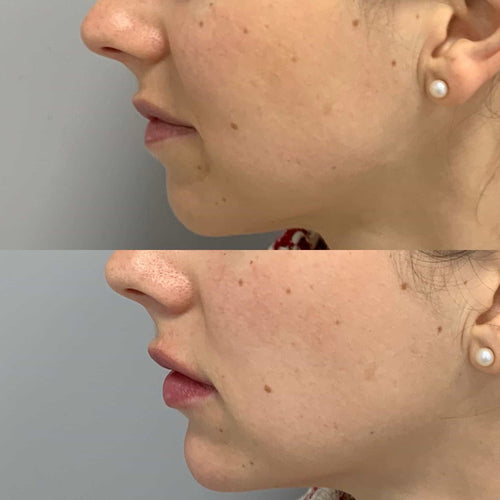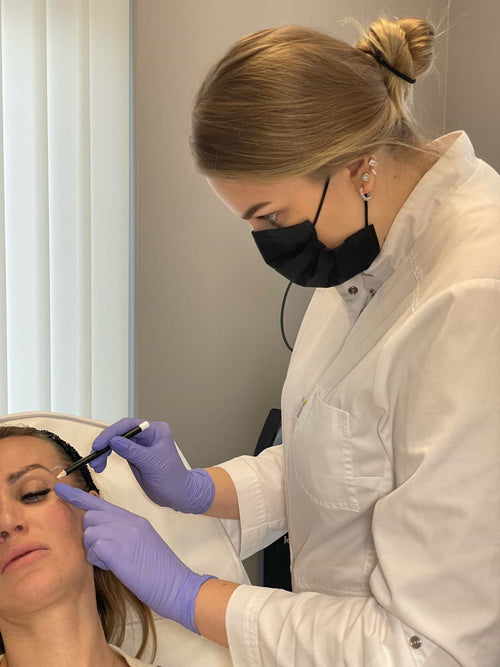Reserve Your Dermal Filler Consultation with Dr. Laura Geige Now

Medical Conditions

Autoimmune Disorders
Autoimmune disorders can complicate the safety and effectiveness of dermal filler treatments.
Schedule a Dermal Filler Appointment with Dr. Laura Geige at It’s Me and You Clinic
Individuals with certain autoimmune conditions, such as systemic lupus erythematosus (SLE), rheumatoid arthritis (RA), or scleroderma**, may be at increased risk of complications like:
• **Infection**: Autoimmune disorders can compromise the immune system, making it harder for the body to fight off infections.
• **Delayed wound healing**: Autoimmune diseases can affect tissue repair and regeneration.
• **Granuloma formation**: This is a localized collection of inflammatory cells that can develop around the filler, causing swelling, pain, and lumps.
• Exacerbation of autoimmune symptoms**: Filler injections may trigger flares in some individuals with autoimmune conditions.
It’s crucial for individuals with autoimmune disorders to consult with a board-certified dermatologist or plastic surgeon experienced in treating patients with these conditions.
A thorough medical history review and physical examination are essential to determine the risks and benefits of dermal filler treatments.
The doctor can assess the specific type and severity of the autoimmune disorder, as well as other factors like medication use and overall health status, to make an informed decision about treatment suitability.
In some cases, alternative aesthetic options may be more appropriate for patients with autoimmune disorders.
Blood Clotting Disorders
Blood clotting disorders can pose a significant risk for individuals considering dermal filler treatments. These disorders affect the body’s ability to form blood clots, increasing the likelihood of bruising, bleeding, and potentially life-threatening complications.
Here’s why people with blood clotting disorders are not good candidates for fillers:
- Increased Bleeding Risk: Fillers inject a substance into the skin, which can trigger bleeding. Individuals with clotting disorders have impaired clot formation, making them more susceptible to excessive bleeding during and after the procedure.
- Bruising and Swelling: The injection process naturally causes some bruising and swelling. For someone with a clotting disorder, these side effects may be more pronounced and prolonged.
- Risk of Thrombosis: In rare cases, filler injections can lead to the formation of blood clots within the blood vessels (thrombosis). This is particularly concerning for individuals with underlying clotting disorders as they are already at an increased risk.
- Treatment Complications: If bleeding or thrombosis occurs, treatment can be more complex and challenging in individuals with clotting disorders. Medications or interventions may require careful consideration to avoid further complications.
It is crucial for anyone considering dermal fillers to disclose their medical history, including any blood clotting disorders, to the healthcare provider. The provider will assess the risks and benefits and determine if the procedure is appropriate.
Active Infections
Medical conditions and active infections can significantly impact candidacy for dermal fillers.
Active Infections**: Individuals with any *active infection* in the area where filler is to be injected should avoid treatment. This includes skin infections, cold sores, or even minor cuts or scrapes. Introducing filler into an infected site could spread the infection or worsen complications.
Consult Dr. Laura Geige for Dermal Fillers at It’s Me and You Clinic
Autoimmune Diseases**: People with autoimmune diseases, such as *lupus* or *rheumatoid arthritis*, may be at higher risk for complications from fillers. These conditions involve the immune system attacking healthy tissues, and filler injections can potentially trigger an adverse immune response.
Blood Clotting Disorders**: Individuals with *blood clotting disorders* should exercise caution with fillers. They might experience increased bruising or swelling, and there’s a risk of filler migration due to impaired clot formation.
Skin Conditions**: Certain skin conditions, such as *rosacea*, *acne vulgaris*, or *eczema*, can make individuals less suitable candidates for fillers. These conditions often involve inflammation or sensitivity, which could lead to complications or an unsatisfactory outcome.
Uncontrolled Diabetes**: People with *uncontrolled diabetes* may have impaired wound healing and increased risk of infections, making them unsuitable for filler injections.
**Pregnancy and Breastfeeding**: The safety of fillers during *pregnancy* and *breastfeeding* is not fully established. It’s generally recommended to avoid these treatments until after breastfeeding has ceased.
It’s crucial for potential filler candidates to discuss their medical history in detail with a qualified healthcare professional. They can assess individual risks and determine if fillers are appropriate.
Skin Health Issues
Acne-Prone Skin
Skin health issues can significantly impact an individual’s self-esteem and confidence. Understanding these issues, their causes, and treatment options is crucial for maintaining healthy skin.
Acne-prone skin is a common concern affecting millions of people worldwide. It is characterized by the development of pimples, blackheads, whiteheads, and other blemishes.
Causes of Acne:
-
Excess oil production: Sebaceous glands in the skin produce oil (sebum), which can clog pores.
-
Hormonal fluctuations: Androgens, such as testosterone, stimulate sebum production. Hormonal changes during puberty, menstruation, pregnancy, and menopause can trigger acne.
-
Bacteria: Propionibacterium acnes (P. acnes) is a bacterium that lives on the skin. When pores are clogged, P. acnes can multiply, causing inflammation and pimples.
-
Genetics: A family history of acne increases the likelihood of developing this condition.
Treatment Options for Acne-Prone Skin:
-
Over-the-counter (OTC) treatments: Benzoyl peroxide and salicylic acid are common OTC ingredients that help unclog pores and reduce inflammation.
-
Prescription medications: Dermatologists may prescribe topical or oral antibiotics, retinoids, or hormonal therapies to treat moderate to severe acne.
-
Lifestyle modifications: Eating a healthy diet, managing stress, and avoiding picking at pimples can help improve skin health.
Fillers are often considered for cosmetic purposes to enhance facial features or reduce wrinkles. However, individuals with active acne may not be suitable candidates for fillers due to the potential for complications such as:
-
Inflammation and infection: Injecting fillers into inflamed skin can worsen acne and increase the risk of infection.
-
Scarring: Fillers can cause scarring if injected improperly or into already compromised skin.
-
Uneven results: Acne-prone skin may not respond to fillers as predictably as healthy skin, leading to uneven or unsatisfactory results.
It is important for individuals with acne to consult a qualified dermatologist before considering any cosmetic procedures, including fillers. The dermatologist can assess the severity of their acne and recommend appropriate treatment options.
Recent Skin Procedures
Skin health issues can significantly impact who is a good candidate for dermal fillers. Active acne or infections near the injection site are major contraindications, as fillers could worsen inflammation and potentially spread infection.
Individuals with uncontrolled chronic skin conditions like psoriasis or eczema may also not be suitable candidates. These conditions can make the skin more sensitive and prone to complications from injections.
Certain medications can also affect skin health and increase the risk of adverse reactions to fillers. For instance, blood thinners can increase bleeding, while retinoids can cause thinning of the skin, making it less suitable for filler injection.
Recent skin procedures, especially those involving lasers or peels, can also make a person ineligible for fillers. The healing process and potential skin fragility following these procedures could lead to complications or unsatisfactory results with fillers.
It’s crucial for potential filler patients to have a thorough consultation with a qualified and experienced practitioner who can assess their overall skin health, medical history, and current medications to determine if they are a good candidate.
Sunburn or Wound Healing
While dermal fillers can be a fantastic tool for rejuvenating skin, certain individuals may not be ideal candidates due to underlying health conditions or medications they are taking.
Here’s a closer look at who might want to reconsider filler injections:
-
Individuals with active infections: Fillers should not be administered if you have an active infection at the injection site or elsewhere on the body. This is because introducing fillers could worsen the infection.
-
People with a history of severe allergic reactions:
If you have a known allergy to hyaluronic acid (the most common type of filler) or other ingredients in fillers, you should avoid them.
-
Individuals taking certain medications:
Some medications, like blood thinners or retinoids, can increase the risk of bruising, bleeding, or swelling after filler injections. It’s crucial to discuss your medication list with a qualified practitioner before getting fillers.
-
People with autoimmune disorders:
Conditions like lupus or scleroderma may make individuals more susceptible to complications from filler injections.
-
Pregnant or breastfeeding women:
The safety of fillers during pregnancy and breastfeeding is not fully established, so it’s generally recommended to avoid them during these periods.
It’s important to have a thorough consultation with a board-certified dermatologist or plastic surgeon experienced in injectables. They will assess your individual circumstances, medical history, and skin condition to determine if fillers are appropriate for you and what type of filler would be best suited to your needs.
Pregnancy and Breastfeeding
Potential Risks to the Fetus
Pregnancy and breastfeeding are significant periods in a woman’s life, requiring careful consideration regarding medical interventions like cosmetic fillers.
During pregnancy, hormonal fluctuations can significantly impact how the body responds to substances, including fillers. The safety of using fillers during pregnancy is not definitively established, and potential risks to the fetus are a major concern.
The placenta acts as a barrier between mother and fetus, but it’s not impermeable. Some components of fillers could potentially cross the placenta and affect fetal development. While data on specific filler ingredients and fetal risks is limited, there’s a general principle of avoiding unnecessary injections during pregnancy.
Breastfeeding also presents potential concerns. Certain substances in fillers might be transferred through breast milk to the nursing infant. The long-term effects of this are largely unknown, raising the risk of potential harm to the baby.
It’s crucial for pregnant and breastfeeding women to prioritize the health and safety of themselves and their children. Consulting with a healthcare professional is essential to discuss any cosmetic procedures, including fillers, during these critical phases.
The New Cinema Magazine One One Three Online Humboldt Apothecary CBD Dejour Magazine Electric Youth Magazine
- Xela Rederm Skin Booster Treatments Near Shamley Green, Surrey - January 21, 2026
- Xela Rederm Skin Booster Treatments Near Dormansland, Surrey - January 20, 2026
- Why Vista Edge Vape Is One Of The Best 510 Thread Batteries Available - January 19, 2026
